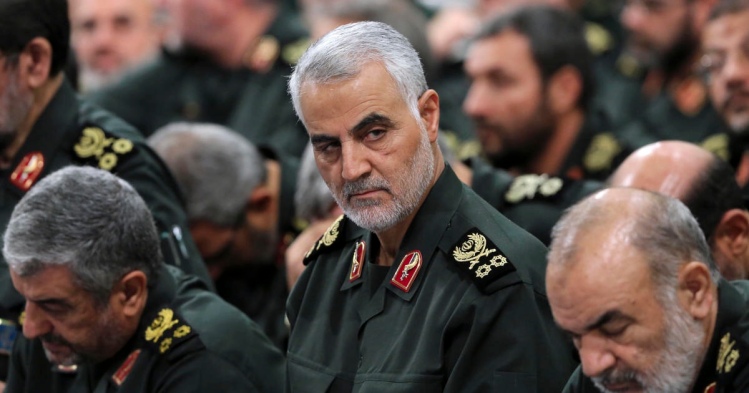Again evincing a major flaw of the 2015 Iran nuclear deal’s failure to restrict Iran’s ballistic missile research, Tehran says it has developed two new medium-range ballistic missiles. If its claims are accurate, these missiles advance Ayatollah Ali Khamenei’s ability to launch a nuclear strike against Israel.
President Hassan Rouhani announced that the missiles have been named after former Islamic Revolutionary Guard Corps Gen. Qassem Soleimani and Abu Mahdi al-Muhandis, the former head of Iran’s primary proxy militia in Iraq, Kata’ib Hezbollah. Both men were killed in a January U.S. drone strike as they departed Baghdad International Airport. So what’s the significance of the Abu Mahdi and Qassem missiles?
While Iran already has a portfolio of ballistic missiles capable of reaching Israel, these new systems are likely to possess more sophisticated targeting capabilities. Iran asserts, for example, that the missiles are equipped with anti-jamming software and low-visibility flight profiles. Whether that is true or not, these missiles do prove the regime’s continuing priority development of nuclear strike platforms. I emphasize that nuclear facet. Due to its cost and complexity, and the escalation-response its use would entail, Iran’s ballistic missile program is specifically focused on nuclear weapons. Iran’s interest here goes beyond the defensive. While Khamenei and the hard-liner faction believe their attainment of a credible nuclear deterrent platform would ensure the regime’s long-term survival, they also view nuclear weapons as a priceless means of advancing the Islamic revolution.
It’s a rational assumption.
Were Iran able to match its support for terrorist groups like Lebanese Hezbollah to a nuclear umbrella, it would have confidence to employ those groups in more aggressive activities and toward more ambitious effects. Deliberately cultivating the perception of being only semi-rational, Iran would hope that it could deter countervailing forces from retaliation with the fear that it might just be willing to use nuclear weapons.
To preserve even a modicum of Middle Eastern stability under this scenario, Washington would have to resolutely reject this nuclear blackmail. The alternative would be to encourage Iranian escalation both regionally and globally. Considering Iran’s willingness to pursue plans such as its 2011 Washington, D.C., bombing plot, tolerating Iranian blackmail would be exceptionally fraught with risk.
Fortunately, the Islamic Republic of Iran is unlikely ever to complete an actual nuclear ballistic strike platform. Were Iran to actively develop nuclear weapons, Israel would take military action to obstruct that pursuit. The legacy of the Holocaust, after all, informs Israel to the necessity of preventing a virulently anti-Semitic and Islamist totalitarian regime from being able to fire nuclear weapons at it.
No comments:
Post a Comment